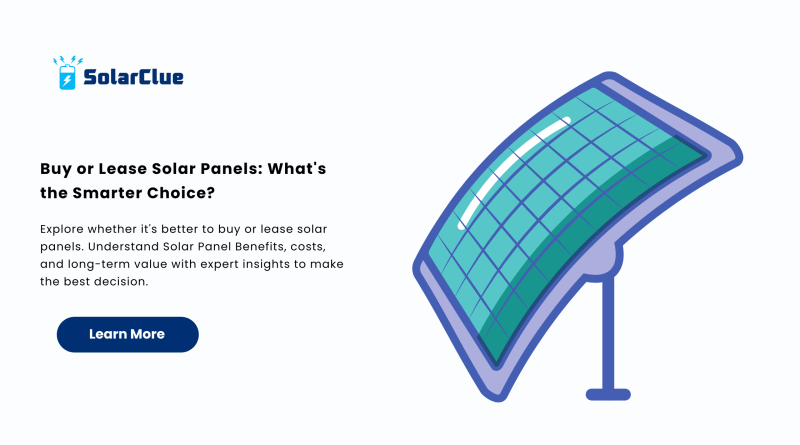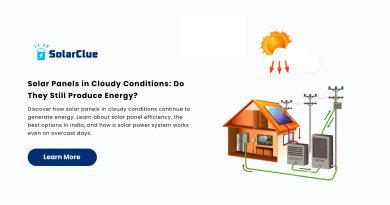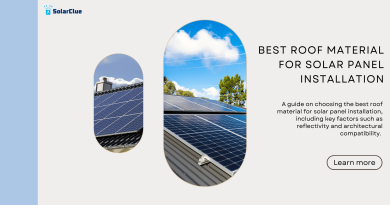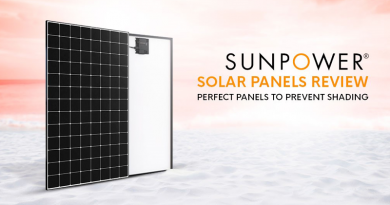Buy or Lease Solar Panels: What’s the Smarter Choice?
Making the shift to Solar Energy is a commendable and intelligent choice for homeowners looking to cut energy bills and reduce their carbon footprint. However, a key decision remains: is it better to buy or lease solar panels? This blog explores both options in-depth, helping you determine the best route for your energy and financial goals.
Table of Contents
- 1 What Does It Mean to Buy Solar Panels?
- 2 What Does It Mean to Lease Solar Panels?
- 3 Cost Comparison: Buying vs Leasing
- 4 Solar Panel Efficiency Over Time
- 5 Environmental and Financial Impact
- 6 Choosing the Best Solar Panel for Home Use
- 7 Pros and Cons of Buying
- 8 Pros and Cons of Leasing
- 9 Is Leasing Ever a Better Option?
- 10 Best Situations for Buying
- 11 Future Trends in Solar Panel for Home Use
- 12 Final Thoughts: Which Should You Choose?
- 13 FAQs
What Does It Mean to Buy Solar Panels?
Upfront Investment and Ownership
When you buy solar panels, you pay upfront or finance the purchase, but you own the system outright. This makes you eligible for incentives such as the federal solar tax credit (ITC) and increases your property value.
Long-Term Value
Buying means long-term savings. Over time, the initial investment is offset by reduced electricity bills. Plus, you’ll enjoy full Solar Panel Efficiency benefits without monthly payments to a third-party provider.
What Does It Mean to Lease Solar Panels?
No Upfront Cost, But Limited Ownership
Leasing allows you to have Solar Panels installed with little to no upfront cost. However, you don’t own the system. Instead, you pay a monthly fee to the leasing company, and they typically reap the financial incentives.
Simplicity and Maintenance
A key advantage is that maintenance and repairs are often included. For homeowners hesitant about upkeep, leasing offers peace of mind, though at the cost of full economic benefits.
Cost Comparison: Buying vs Leasing
Upfront and Long-Term Costs
While buying a solar panel system can cost $10,000–$25,000, leasing offers zero upfront cost but higher long-term payments. Over 20 years, buying often proves cheaper than leasing.
Incentive Access
Buyers can claim local and federal incentives, while lessees generally cannot. This makes ownership a more financially savvy choice.
Solar Panel Efficiency Over Time
Technology Longevity
The Solar Panel Efficiency rate degrades slightly each year—about 0.5%. Ownership allows you to take full advantage of efficient energy production across 25+ years, unlike leasing where the provider holds this benefit.
Environmental and Financial Impact
Reduce Your Carbon Footprint
Whether you buy or lease, using Solar Power reduces greenhouse gases. Still, owning gives you control over upgrades, maximizing environmental impact.
Property Value Boost
Homes with owned solar panels are more attractive in the market. Leasing doesn’t typically raise home value since buyers must assume the lease.
Choosing the Best Solar Panel for Home Use
Customization
Buying enables full customization based on your needs, ensuring you get the best solar panel technology tailored to your energy consumption.
System Size
When leasing, you might be restricted to pre-set packages. Ownership offers flexibility in choosing the solar power system size.
Pros and Cons of Buying
Pros:
- Full ownership and control
- Access to incentives
- Increased home value
Cons:
- Higher upfront cost
- Responsible for maintenance (unless under warranty)
Pros and Cons of Leasing
Pros:
- Little to no upfront cost
- Maintenance often included
Cons:
- No incentives
- No equity in the system
- May complicate home sale
Is Leasing Ever a Better Option?
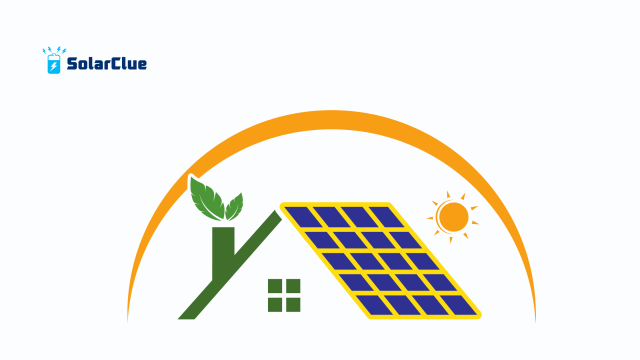
Leasing might be suitable for homeowners who:
- Plan to move within 5–7 years
- Can’t afford upfront costs
- Want hassle-free maintenance
Best Situations for Buying
Buying is ideal for those who:
- Plan to stay long-term
- Can utilize tax incentives
- Want to maximize savings and equity
Future Trends in Solar Panel for Home Use
With falling costs and increased efficiency, owning Solar Panels is becoming more viable for the average homeowner. Leasing may decrease in popularity as financing options improve.
Final Thoughts: Which Should You Choose?
If long-term savings and ownership appeal to you, buying solar panels is the superior option. Leasing suits those who prefer lower entry costs and maintenance-free systems, but it offers less control and fewer financial perks.
FAQs
Q1: Which is more affordable in the long run, buying or leasing solar panels?
Buying is usually more affordable over time due to savings on electricity and access to incentives.
Q2: Can I upgrade my leased solar system?
No, leased systems are typically fixed. Ownership allows for upgrades.
Q3: Do leased solar panels increase property value?
No, they usually don’t because the new owner must take over the lease.
Q4: Are there financing options for buying solar panels?
Yes, many companies offer loans and financing for solar purchases.
Q5: What happens at the end of a solar lease?
You can renew the lease, remove the system, or purchase it at market value.
Looking to explore more about solar solutions? Check out our in-depth resources at SolarClue or read our latest guides at blog.SolarClue.com. Power your future smartly today!

